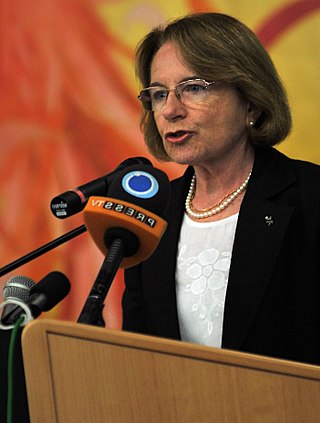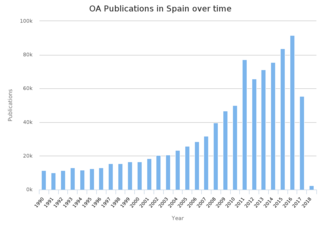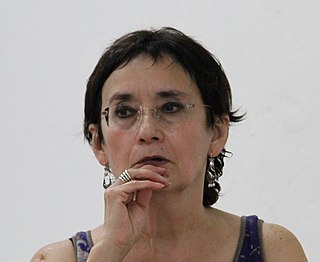
The Mexican Space Agency is the national space agency of Mexico, established in July 2010. The agency does not have infrastructure, and aims to promote and coordinate education, research and development of the space-related activities that are performed in the country.

Ana María CettoKramis is a Mexican physicist and professor. She is known for her contributions to quantum mechanics, stochastic, electrodynamics, and biophysics of light, and for her work as a pacifist. From 2003 to 2010 she was Deputy Director General of the International Atomic Energy Agency (IAEA). She is also professor at the Faculty of Sciences at the National Autonomous University of Mexico (UNAM), of which she was also director. Cetto is responsible for several scientific literature programs in Latin America and for several international programs on the promotion and participation of women in science.
The Redalyc project is a bibliographic database and a digital library of Open Access journals, supported by the Universidad Autónoma del Estado de México with the help of numerous other higher education institutions and information systems.

Juan David García Bacca, was a Spanish–Venezuelan philosopher and university professor.
The Latin American Bibliography refers to the set of databases and information services on academic journals from Latin America and the Caribbean created by the National Autonomous University of Mexico (UNAM) in the decade of the seventies.

Jacqueline Peschard Mariscal is a Mexican sociologist who specializes in electoral integrity and democracy studies. She was President Commissioner of the Federal Institute for Access to Public Information from 2009 until 2013. She also served as Counselor to the Instituto Nacional Electoral from 1997 to 2003. In 2010, she was elected president of the Iberoamerican Network of Data Protection (RIPD), which is a forum for promoting the universal right to data protection across Latin America.

The Centro Universitario de Investigaciones Bibliotecológicas (CUIB) of the Universidad Nacional Autónoma de México (UNAM), was created on December 14, 1981 according to the creation agreement, signed by the Dean PhD. Octavio Rivero Serrano. Its goal is theoretical and applied research on phenomena related to the information registered on printed forms and other media: its sources, selection and acquisition, its organization and representation, in addition to the problems concerning the media, processes and technologies used for the storage, recover and distribution of the information.

Julio Ernesto Rubio Barrios is a Mexican researcher and administrator at Monterrey Institute of Technology and Higher Education.

María Elena Meneses Rocha was a Mexican journalist, professor of journalism and researcher into media, communications and the Internet with the Monterrey Institute of Technology and Higher Education, Mexico City. On the campus she taught and was the coordinator of the Cátedra Sociedad de la Información, which does research and consulting in mass media and information technology. She also worked with mass media, as a writer and as a commentator for print, broadcast and Internet media, mostly commenting on information technologies.

Delia Crovi Druetta is a professor and researcher in communications and Latin American studies at the Universidad Nacional Autónoma de México, member of the Sistema Nacional de Investigadores, Level III.
Alicia Girón González is the past president of the International Association for Feminist Economics (IAFFE), her tenure was 2014 to 2015. Girón has also served as director of Universidad Nacional Autónoma de México's (UNAM) Economic Research Institute (IIEc).
Javier Esteinou Madrid is a Mexican journalist, professor and researcher whose work has been recognized with Level III membership in the Sistema Nacional de Investigadores and with Mexico’s National Journalism Prize twice. His work is mostly concerned with the effects of cultural hegemony and new technologies on communications and society.
María Cristina Pineda Suazo (1954) is a Honduran astronomer, physicist, civil engineer, professor, and scientific investigator. She was Director of the Astronomical Research Center (CEACS-UNAH), and currently serves as dean in the Faculty of Spatial Sciences (FACES) at the Universidad Nacional Autónoma de Honduras. She belongs to several scientific organizations, including the International Astronomical Union (IAU), the Asamblea de Astrónomos de América Central (AAAC), and the Fundación Salvador Moncada para el Avance de la Ciencia. Pineda also serves as President of the National Committee for Astronomy in Honduras.

Epigraphia 3D is a scientific project that consists in 3D models of ancient inscriptions. Its scope includes scientific research, education in epigraphy, and encouraging interest of the general public.

Joseph Hodara is an Israeli sociologist and journalist. Hodara teaches at Bar-Ilan University.

In Spain, the national 2011 "Ley de la Ciencia, la Tecnología y la Innovación" requires open access publishing for research that has been produced with public funding. The first peer-reviewed open access Spanish journal, Relieve, began in 1995. Publishers CSIC Press and Hipatia Press belong to the international Open Access Scholarly Publishers Association.

María Teresa Rojas Rabiela is an ethnologist, ethnohistorian, Emeritus National Resercher and Mexican academic, specializing in Chinampas of Mexico's Basin, history of agriculture, hydraulics, technology, and labor organization in Mesoamerica during pre-Columbian and colonial eras, as well as historical photography of Mexico's peasants and indigenous people. She is recognized as a pioneer in historical studies on earthquakes in Mexico. From 2018 to 2021, Rojas Rabiela was involved in the restoration of the section of the pre-Hispanic aqueduct of Tetzcotzinco, Texcoco, known as El caño quebrado.











